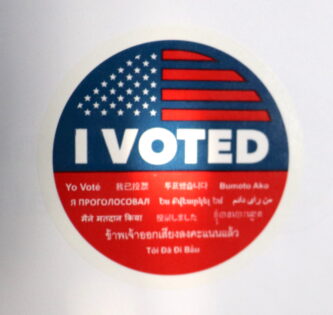Many of the propositions on this year’s ballot pertain directly to California State University students. Photo by Iracema Navarro
By Iracema Navarro, Politics Editor
There are 12 state-wide propositions on the California ballot this year, and after analyzing them, the Bulletin chose the six that most affect the largest portions of CSUDH’s student demographic, in terms of age, ethnicity and socioeconomic status.
Proposition 16
Allows diversity as a factor in public employment, education, and contracting decisions
Considering our student population is about 90 percent “minority” and 60 percent is female, this measure, if passed, could significantly affect current and future CSUDH students in terms of employment and acceptance into graduate programs.
The measure would allow public schools including the California State University and the University of California, as well as local governments, to consider race, color, sex, ethnicity, and origin in its diversity decision-making in hiring, costs, and admission.
The California State University system supports the removal of the ban on affirmative action to increase diversity and equality to the races that have been previously discriminated against.
Students for Fair Admissions, is a nonprofit membership of students, parents, and others who are against the proposition stating, “A student’s race and ethnicity should not be factors that either harm or help that student to gain admission to a competitive university.”
Proposition 17
Restores the right to vote after completion of prison term.
The right to vote would be restored for U.S. citizens who are on parole in California. CSUDH student organization, Scholars United was founded to help formerly incarcerated students to a higher education pathway.
The proposition would restore the citizen’s right to vote for people on state parole who have completed their prison terms, registered to vote, and are at least the age of 18. Prior to 1974 and proposition 10, voting rights were denied even when released from prison and parole was completed. According to a 2011 report by the Florida Parole Commission, over 30,000 felons were granted their civil rights and 11.1% had reoffended in 2011 concluding inmates are less likely to commit a crime in the future if the right to vote is restored.
Those in opposition including Election Integrity Project California and Crime Victims United of California signed for the argument against the proposition. “Parole is the adjustment period when violent felons prove they are no longer a violent threat to innocent citizens living in a civil society.” Then after the right to vote should be granted not before the completion of their sentence including parole, with some felons having been convicted of murder or rape.

Voters can proudly display once dropping off their ballot or after voting in a vote center. Photo by Iracema Navarro.
Proposition 18
Amends California’s constitution to permit 17-year-olds to vote.
This may not affect current CSUDH students but definitely would future Toros. If passed, 17-year-olds would be allowed to vote in primary and special elections if they would be 18 at the time of the general election that follows.
The proposition is endorsed by Gov. Gavin Newsom and the California Association of Student Councils. The argument for the proposition is an increase in youth civic engagement with young voters entering college, students would provide a voice on important issues.
According to an analysis from the Center for Information & Research on Civic Learning and Engagement, 27.1% of young voters ages 18-29 cast their ballot in the 2018 elections in Los Angeles County.
Election Integrity Project California is an opponent of the proposition that says science has affirmed teens not having fully developed the area of logic and reasoning of their brain. “They have no real-world experience.”
Proposition 21
Local government’s authority expanded to authorize rent control.
Unless they live at home, most college students are paying rent of some sort. Rent control is currently established by state law but Proposition 21 would allow cities and counties to apply more rent control on residential properties over 15 years old, excluding landlords who have no more than two properties.
The proposition is supported by Vermont Sen. Bernie Sanders and others who believe it would help keep families in their homes and stop more homelessness.
A study released on Oct. 20 from UCLA’s Center for the Transformation of Schools reported one in 10 California State University students have been impacted by homelessness.
Gov. Gavin Newsom is against the proposition and claims it would discourage affordable housing, and that it is unnecessary because the state already has the strongest rent protections in the country.
Proposition 22
Exempts app-based transportation and delivery companies from providing employee benefits to certain drivers
Although people under age 30 account for less than 2 percent of ride-share drivers, that age group accounts for the largest percent of ride-share riders, 46 percent. age demographic drivers, Proposition 22 is what would decide app-based transportation and delivery companies as independent contractors or as employees.

Transportation and delivery company apps displayed on the iPhone. Photo by Iracema Navarro.
Backed by companies such as Uber, Lyft and DoorDash, about $188 million has been spent on the proposition. The proposition would make drivers for delivery companies and app-based rideshare independent contractors rather than be classified as employees. The independence of when, where, how much to work for along with a threat on 158,000 drivers is on the ballot.
The California Labor Federation is against the proposition and claims drivers should be employees in order to receive benefits and protections such as health insurance, overtime, and paid sick days from the employer.
Proposition 24
Amends consumer privacy laws
The proposition would have consumer data privacy laws changed in California.
With the power a cellphone contains, the shared information in apps, and the tracking location constantly asked, cell phones are continuing to be important to communicate. A 2014 study stating 60% of U.S. college students admitting they may be addicted to their cellphones.
The current laws in consumer privacy would expand such as limit sharing of personal data, correct personal data, and limit the use of personal data considered sensitive, allowing consumers to control their data and hold corporations accountable. The ACLU is against the proposition for the loopholes and believes Californians should not pay for privacy.
Former presidential candidate Andrew Yang supports the proposition stating that “most importantly, Prop. 24 provides Californians greater control over their data: If they don’t like a business or don’t trust its privacy protections, consumers can tell it that it can’t sell their personal information, and businesses are prohibited from unfairly punishing consumers for exercising these rights. This is a strong new protection, and puts control where it belongs: with the consumer.”
According to a 2019 survey conducted by the Pew Research Center, 63% of Americans favor more government regulation but don’t understand the current privacy laws.

